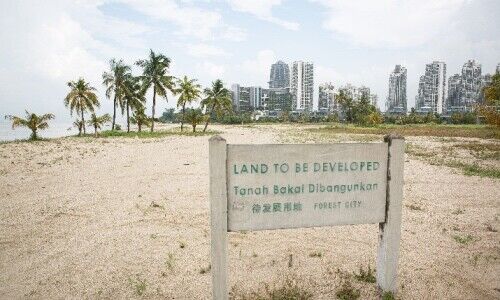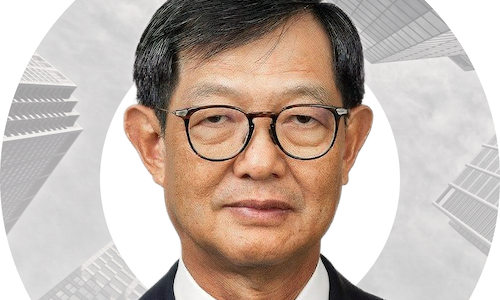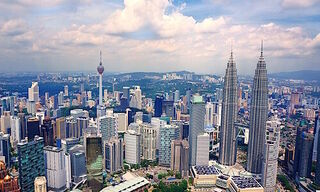The country launches a package of tax incentives and creates a special financial zone in the long moribund Forest City development.
Across Asia, Forest City's name has become synonymous with that of a new-age ghost town — near-empty residential skyscraper included.
A mammoth project of four man-made islands seemingly stamped out of the water in 2014 by a mainland property developer has gone exactly nowhere. For example, a «NikkeiAsia» article (registration required) says that just 10,000 people live there now.
Singing Canary
That is a good deal less than the 700,000 once expected in an area that is 30 square kilometers large. In fact, in hindsight, it seems more like the canary in the coal mine that foreshadowed China’s eventual real estate crisis.
But as Singapore does, Malaysia more or less dutifully follows – even though there is a bit of complicated history around all that, as finews.asia once commented on.
Gigantesque Planning
«NikkeiAsia» indicates that things are kicking into a higher gear, with the two countries expected to seal the deal on developing a Johor-Singapore Special Economic Zone by the end of the year.
It is nothing for the faint-hearted given the whole scheme in the offing will be four times the size of the city-state itself.
Niche Hub
And Forest City? It is not being left out. Almost two months ago, a tax incentive package took a cookie-cutter approach to Singapore's well-trodden path of creating niche financial industry hubs.
In fact, «NikkeiAsia» reported that none other than Malaysian Prime Minister Anwar Ibrahim was on hand to address interested parties at a September investor event.
The Not Fiscal Question
The claimed incentives warrant certain consideration. One of the key ones on offer appeared to be the fact that Forest City (Palau Satu) was the only location anywhere to offer both fiscal and non-fiscal incentives.
We scoured the four slides, bullets, charts, and graphs up and down to see what counted as non-fiscal and came up with a big nada – unless you count a tax reduction of 10 percent on construction work or a special deduction for relocation. But, no, that is still fiscal.
A Crusoe Question
Maybe they had meant the unexpected bliss of a Robinson Crusoe-like stay on a remote, little-habited island, but we don’t think that is the case.
So - let’s just focus on the fiscal ones. Here is where the rubber meets the road, or the cookie dough gets baked, it seems, when looking at the fine toothcomb examination finews.asia undertook related to the city-state's amended requirements in 2023.
Question of Pricing
To qualify in Malaysia, you will need about $6.73 million in assets under management to place at current exchange rates (or 30 million Malaysia ringgit – meaning Trump 2.0 is likely to take a bit of the edge off that given enough time). That is smartly placed just below Singapore’s minimum of $7.5 million – but it is certainly not cheap.
That would then give you the right to pay exactly zero in taxes over the next 20 years –d provided you invest at least $2.24 million, or 10 percent of the AuM booked, whichever is lower.
Dubious Benefit
You also get a stamp duty exemption when transferring what can only be locally based properties into a Single-Family Office Vehicle, although we are guessing that is probably of dubious benefit, or at best, a drop in the bucket for your average family office.
Then we get to the conditions - and here it gets interesting. The family office must register a new investment holding company with the Securities Committee to get the tax incentive, an almost certain bureaucratic nightmare best left to the malleable third or fourth generation.
No Free Lunch
Beyond that, they would have to employ at least 2-4 full-time staff and have at least one investment professional on hand - and pay them a minimum monthly salary of a good $2,200.
Besides, they will have run costs of at least $112,000 (again, at pre-Trump 2.0 rates) a year locally, and invest about a quarter of a million dollars (US) or 10 percent of the AuM booked, whichever is higher. That is great, but where are you going to find anyone - as it is highly unlikely that there will be any kind of finance industry professional among the 10,000 living there now.
Better Wait
You get what we are saying. But don't just take it from us. Even Wong & Partners, a local Malaysian law firm cited by «NikkeiAsia» seemed somewhat skeptical.
«It remains to be seen if the scheme at Forest City SFZ will be a solid alternative to other established jurisdictions, such as Singapore and Hong Kong,» they indicate, not very cryptically.
Still Nobody There
The Tokyo-based publication added that, since the announcement, not much seems to have changed in Forest City, with few people roaming the streets and numerous shops still closed.
At least there is a positive aspect to that. There is little likelihood of the development becoming victim to a major money laundering scandal on the scale of that recently in Singapore because of a wayward family office or two.
And No Smurfs
That also means no chance of any kind of ATM smurfing given no one can actually buy anything.


























